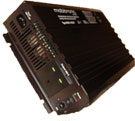Inverter Range

Supply of 12v and 24v power Inverters to suit vehicle applications.
supply only or supply and fit in local Shrewsbury area.
An Inverter may be used to supply either 110 volt or 240 volt ac equipment to be used off grid from vehicle dc battery supply.
Pure Sine Wave Inverter
The pure sine wave inverters are generally more expensive but preferred if sensitive electronic equipment is to be used.
Pure sine wave inverters tend to have a higher efficiency rating then modified sine wave inverters.
Modified Sine Wave Inverter
Modified sine wave inverters offer cheaper capital cost than the pure sine wave types however are more suited to power less electronically sensitive equipment.
Inverter Efficiency
Inverter efficiency is typically less than 85%, so some power loss will occur.
A lower efficiency figure means that more electrical power will be required from the battery to power a specific load, therefore the battery will discharge more.
Shut down voltage
This is the preset voltage at which the inverter will no longer operate. Typically 10.5 to 11 volts on 12v inverter systems.
Standby Current
This is the electrical current consumed by the inverter when it is switched on but no load applied.
Inverter Input Power Source
Reserve Battery Capacity
The reserve battery capacity will determine how long the inverter can be operated.
The higher the wattage load of the equipment being powered by the inverter system, then the less time the equipment can be operated before batteries
are discharged to the level at which the inverter will no longer operate.
Battery Management System
A battery management system may be required to control recharging of auxilliary batteries used to power inverter systems.
Van Conversions and Split Charge Systems
Typically, an inverter fitted in to a converted van will be powered by an auxilliary battery. If a split charge system is fitted then the auxilliary battery will be recharged from the spare capacity of the vehicle alternator whilst the engine is running or van is driven.
Voltage Sensitive Relays (VSR)
VSR's are a traditional method used to run a split charge system. The VSR is an electromechanical switch which connects the vehicle starter battery to the secondary battery when the vehicle engine is running and alternator is charging.
Problems arise with VSR systems because charging is controlled only by the vehicle alternator.
Programmable VSR
Programmable voltage sensitive relays are now available. Programming allows cut in and cut out voltage parameters to be set.
Battery to Battery Charger
A battery to battery charger is a preferred method for vehicle split charge systems to allow control of charging current to secondary batteries.
Second Alternator
A second alternator may be fitted to the vehicle dedicated to charging the auxilliary battery. This relies on available space and drive capacity in the engine bay.
Battery Type
System efficiency may be increased by selection of type of auxilliary battery but specific charging requirements may need to be addressed. Lead acid batteries have a weight disadvantage compared to Lithium type batteries.
Load Reduction
Reserve battery power can be extended by reducing electrical load by for example LED lighting instead of standard filament bulb types. Battery to battery chargers may have facility to control duty cycle of direct wired equipment.
